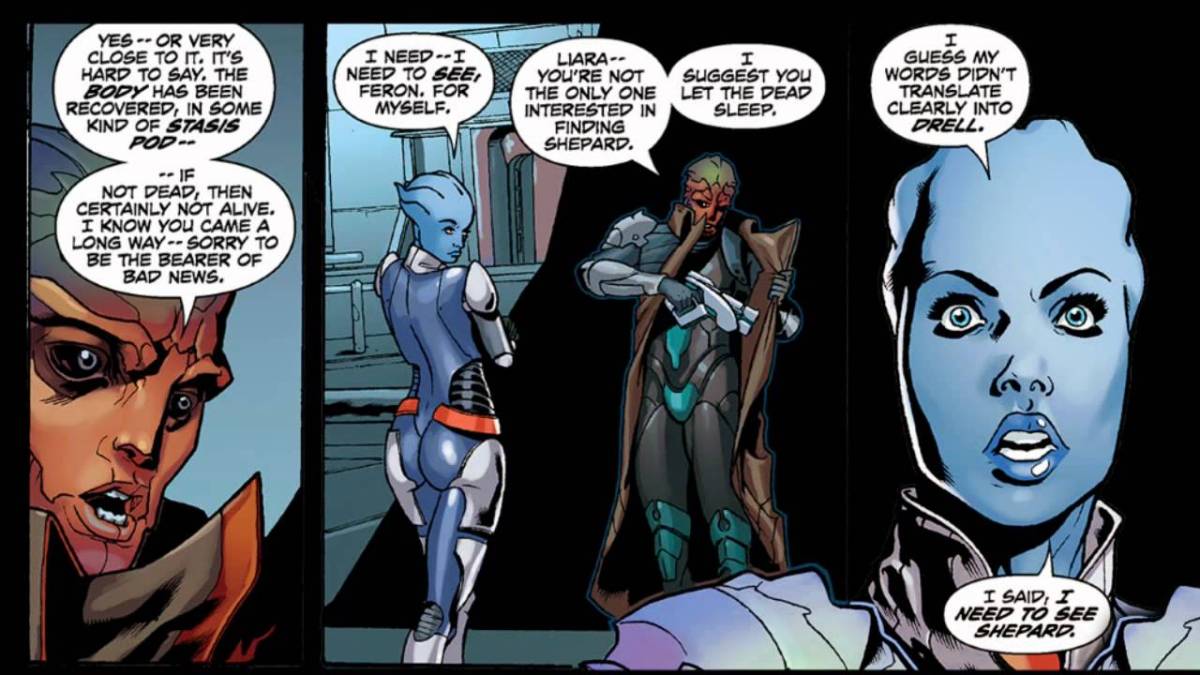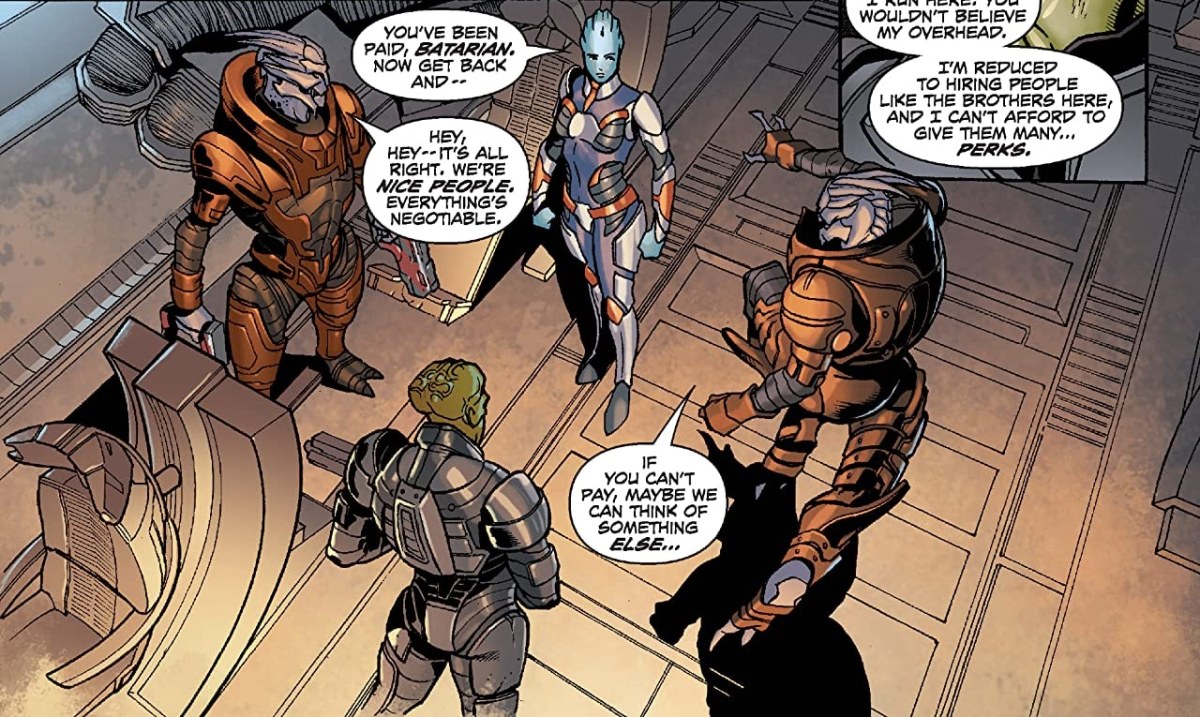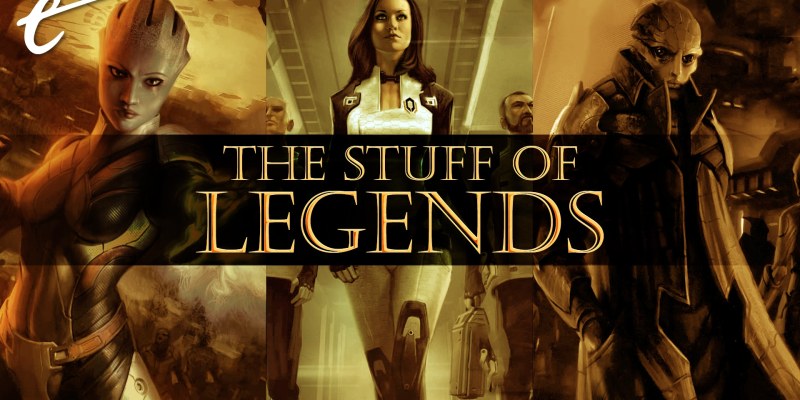Last time on The Stuff of Legends, we explored the worst Mass Effect tie-in novel, Mass Effect: Deception. It had lore inconsistencies, weird narrative decisions, and barely achieved actually tying itself into the greater story. Reading Deception doesn’t bring you closer to its world. The four-issue comic Mass Effect: Redemption, on the other hand, is arguably the strongest franchise tie-in. It delivers worthwhile storytelling that knows how to build a universe.
Redemption is not only key to understanding the greater story of Mass Effect, particularly the second entry, but also Mass Effect 2: Lair of the Shadow Broker, one of the best-received DLC expansions in BioWare’s history. If you don’t read it, it’s not impossible to follow the DLC’s plot, but it is that much less emotionally engaging. If you neither read the comic nor play the DLC, Mass Effect 3 pivots to account for this. You’re free to engage with Mass Effect at whatever level you’re most interested, with payoff for those who delve deepest. Plus, on the off-chance you haven’t played Mass Effect 2 yet, Redemption serves as a primer for one of the game’s new primary locations — the sprawling criminal underworld station of Omega.
How did they pull this off? Coordination. Like the Normandy SR-2, everyone had a role to play and knew what needed to be done. Though John Jackson Miller was brought back due to his work on the Knights of the Old Republic comics, his role was to adapt Mass Effect 2’s co-narrative lead Mac Walters’ story to a comic script. Art would be primarily led by Omar Francia, cover art by Daryl Mandryk, coloring by Michael Atiyeh, and lettering by Michael Heisler. With a direct link to the main development team, any adjustments to Mass Effect 2 could be easily accounted for.
Mass Effect: Redemption was also in the cards well in advance. Walters explained in an interview with IGN, “The idea is that we’re both expanding on characters that we didn’t really explore in Mass Effect 1 and also looking at opportunities to expand on them even further in the DLC.” Redemption would be the first step in this initiative.

This all pays off brilliantly thanks to Redemption going for a daringly different take on Mass Effect. Where the original game was sort of an R-rated Star Trek throwback piece, Redemption goes a decade later, drawing directly from the likes of Blade Runner and Ghost in the Shell, both in aesthetic and tone. Liara’s journey to safeguard Shepard after the opening events of Mass Effect 2 is harrowing, forcing her to grow up considerably from the humble Spock-like scientist she was into the badass biotic information broker we find her as in the sequel. Her character arc here is meaningful, filling the void for Shepard without feeling forced.
This story also introduces many more races and factions. Aria T’Loak and her criminal empire are a dominant force on Omega, so it makes sense they’re directly linked. The Collectors’ involvement is subtle at first, only hinting at their true threat to the galaxy. The Shadow Broker was already established as a key player, but now we really get a glimpse into his operation as Liara goes head to head with the mysterious man.
Mass Effect: Redemption also prominently features new key character Feron. A drell information trader, Feron is at times both an ally and hindrance to Liara before becoming her greatest asset at the story’s climax. Unlike Mass Effect 2’s Thane, he’s not dour and introspective, but a troubled jokester with his heart in the right place. It’s not unsurprising that Lair of the Shadow Broker contains lines that imply Liara was a bit taken by the fellow, despite their early struggles working together in Redemption.

That is the real trick to Redemption. Liara and Feron’s mutual war with the Shadow Broker isn’t over when the comic concludes, yet it still has a solid finale. Shepard’s body falls into the hands of Cerberus, revealing their role in all this and why Liara is scarcely surprised to see you with them when you meet her again in Mass Effect 2. The Collectors have been thwarted for now, but it’s obvious they and the Shadow Broker present a far greater threat than the Geth on their worst day. The stage is set for two more tales in the saga, all while the intriguing mystery and subterfuge comes to a satisfying close for Mass Effect: Redemption.
It’s tight, well paced, and legitimately adds to the story. Plus, the cover art is gorgeous, capturing the energy of each issue brilliantly. Meanwhile, the only failing of the interior art — Liara’s liberally flexed spine aside — is the coloring. The world is rendered oddly flat in the first two issues, with more cartoonish shades sapping some life from the pages, despite the shading and paneling across the whole series jumping gracefully from film noir-brooding to a chase through asteroids at the drop of a hat. Fortunately, the coloring improves in the latter two issues, and that this is the biggest complaint speaks to how well the rest of the project was executed.
Whether you’re exploring Mass Effect for the first time or revisiting the trilogy for the zillionth, if you haven’t poked around in the expanded fiction, Redemption is an excellent place to start. It pairs brilliantly with its source material, heightens the Shadow Broker DLC’s stakes, and gives fan-favorite Liara a starring role. What more could you need?
